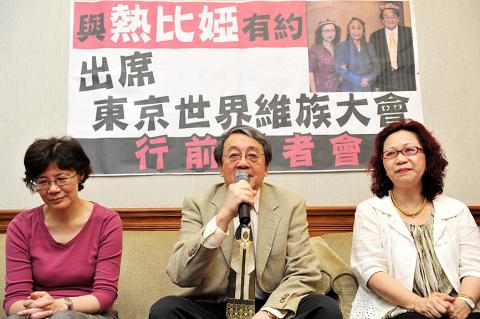Human rights activists urged President Ma Ying-jeou (馬英九) yesterday to press China on political reforms in the speech he gives on his inaugural for a second term on May 20.
Two recent events in China — the dramatic escape of blind human rights activist Chen Guangchen (陳光誠) from illegal house arrest and a deadly clash between Chinese and ethnic Uighurs in Xinjiang Province — revealed worsening human rights conditions in the country, the activists said.
“As the beacon of democracy in the Chinese-speaking world, Taiwan needs to weigh in on rights issues to show our commitment to democracy,” said Paul Lin (林保華), president of the Taiwan Youth Anti-Communist Corps.

Photo: Chien Jung-fong, Taipei Times
Ma should press Beijing on the issue of political reforms, and the ideal platform would be Ma’s inauguration speech on May 20, Lin said at a press conference prior to his departure for Tokyo to attend the general assembly of the World Uighur Congress from Monday to Thursday.
Speaking at the same press conference, Taiwan Friends of Tibet chairwoman Chou Mei-li (周美里) said the human rights situation in China demands immediate attention.
The self-immolation of Tibetan monks in protest against Beijing’s rule is an example of the problem there, she said.
“There is so much suppression in China that is not being noticed,” Chou said.
“It’s an important issue to the global community and we should take part in changing that situation,” she added.

The manufacture of the remaining 28 M1A2T Abrams tanks Taiwan purchased from the US has recently been completed, and they are expected to be delivered within the next one to two months, a source said yesterday. The Ministry of National Defense is arranging cargo ships to transport the tanks to Taiwan as soon as possible, said the source, who is familiar with the matter. The estimated arrival time ranges from late this month to early next month, the source said. The 28 Abrams tanks make up the third and final batch of a total of 108 tanks, valued at about NT$40.5 billion

Two Taiwanese prosecutors were questioned by Chinese security personnel at their hotel during a trip to China’s Henan Province this month, the Mainland Affairs Council (MAC) said yesterday. The officers had personal information on the prosecutors, including “when they were assigned to their posts, their work locations and job titles,” MAC Deputy Minister and spokesman Liang Wen-chieh (梁文傑) said. On top of asking about their agencies and positions, the officers also questioned the prosecutors about the Cross-Strait Joint Crime-Fighting and Judicial Mutual Assistance Agreement, a pact that serves as the framework for Taiwan-China cooperation on combating crime and providing judicial assistance, Liang

A group from the Taiwanese Designers in Australia association yesterday represented Taiwan at the Midsumma Pride March in Melbourne. The march, held in the St. Kilda suburb, is the city’s largest LGBTQIA+ parade and the flagship event of the annual Midsumma Festival. It attracted more than 45,000 spectators who supported the 400 groups and 10,000 marchers that participated this year, the association said. Taiwanese Designers said they organized a team to march for Taiwan this year, joining politicians, government agencies, professionals and community organizations in showing support for LGBTQIA+ people and diverse communities. As the first country in Asia to legalize same-sex

MOTIVES QUESTIONED The PLA considers Xi’s policies toward Taiwan to be driven by personal considerations rather than military assessment, the Epoch Times reports Chinese President Xi Jinping’s (習近平) latest purge of the Chinese People’s Liberation Army (PLA) leadership might have been prompted by the military’s opposition to plans of invading Taiwan, the Epoch Times said. The Chinese military opposes waging war against Taiwan by a large consensus, putting it at odds with Xi’s vision, the Falun Gong-affiliated daily said in a report on Thursday, citing anonymous sources with insight into the PLA’s inner workings. The opposition is not the opinion of a few generals, but a widely shared view among the PLA cadre, the Epoch Times cited them as saying. “Chinese forces know full well that